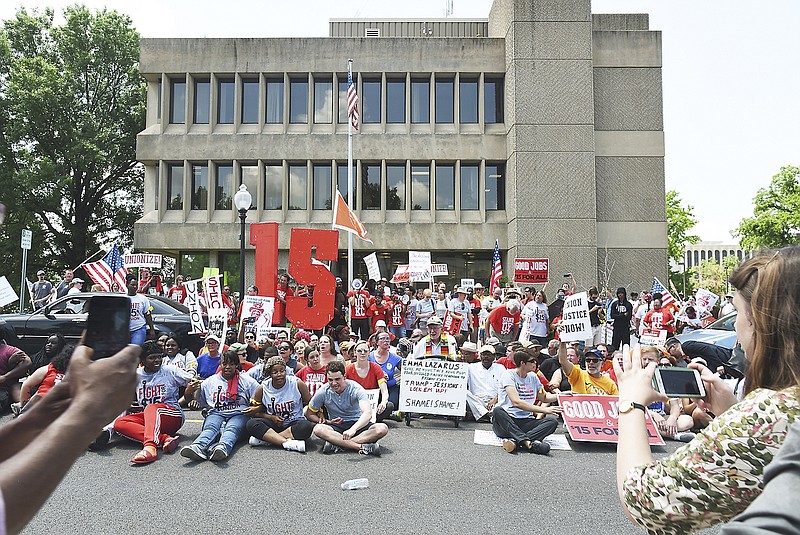Weekly rallies in downtown Jefferson City since May 14 have focused on holding a moral revival, U.S. government militarism, economic injustice, unavailable health care and cuts to education.
Monday afternoon's rally outside the state Capitol - which continued criticisms of lawmakers for what protesters said were legislative "attacks" on workers, unions and poor families - was possibly the largest yet.
The Poor People's Campaign wound up its five-week set of rallies in Jefferson City, one of about 40 capitols where protesters used non-violent action to bring attention to issues affecting the country's poorest populations. It is, in addition to being a "moral revival," intended to be a revival of Martin Luther King Jr.'s Poor People's Campaign.
Monday's march, in part, concentrated on efforts the Missouri General Assembly made over the past session to weaken organized labor, said Rod Chapel, a Jefferson City attorney who was at the rally to assist members of the group with legal representation.
Each week, members of the group practiced nonviolent protest, choosing to sit in a street after the rallies until police officers arrested them. Police cited those arrested with failing to obey police officers who commanded them to leave the street.
Police cited 77 people with the city ordinance Monday.
Among them were W.T. Edmonson, a Jefferson City resident and past president of the local NAACP branch, who assisted the Rev. Jon Bennett, as protesters walked in 90-degree-plus heat about five blocks from First Christian Church to the Capitol for the rally - then back.
Both men were among the first to be arrested during the sit-in.
Edmonson said he watched last year as Kansas City and St. Louis voters passed measures to raise local minimum wages to $10 an hour, only to see Missouri legislators pass a preemptive statute that prohibited local governments from raising minimum wages above the state level of $7.70 an hour.
"Fast food workers were trying to get a living wage. Then the Legislature comes in and overrides it," Edmonson said. "The legislatures say they want locals to decide, then come in and change it. That's hypocrisy at its highest. The state complains every time the federal government tells it what to do."
About 70 members of the United Food and Commercial Workers union were easy to distinguish in the crowd of more than 300, all wearing bright yellow T-shirts. Also represented were members of the auto workers union from the Ford Motor Company Kansas City plant.
Retired auto worker Pat Hayes said since its beginning in 1935, the union has been involved in efforts for social justice.
"Our union's been a long-time participant in the fight for better wages," Hayes said. "Today's demonstration is a labor-focused march."
He said votes against Proposition A on Aug. 7 will protect jobs. Former Gov. Eric Greitens signed a bill into law in 2017 that allows unions to continue representing workers, but provides employees the ability to opt out of paying union dues. The law never took effect because opponents in August submitted more than 310,000 signatures to the Secretary of State's Office to force a referendum. The proposition asks voters if they want to adopt last year's bill as is or reject it.
"Right to work's a key issue for us," Hayes said. "We see that as a direct attack on workers."
Among protesters Monday were members of Stand Up KC, a coalition of fast food and retail workers from Kansas City who have banded together to demand better wages and serve as a voice for low-wage workers, according to the organization's website.
Also speaking was the Rev. Rodney Williams. Edmonson, Bennett and Williams were among the Medicaid 23 - mostly ministers arrested during protests in the Senate chambers of the Capitol in 2014. More than 300 demonstrators, led by clergy, rallied in the Rotunda then went to the Senate's upper galley to urge lawmakers to expand Medicaid assistance to poor Missourians. Police arrested 23 of the protesters after their singing, praying and chanting was loud enough to force senators to stop their debate because they couldn't hear each other.
Chapel and state Rep. Jay Barnes, R-Jefferson City, subsequently represented the defendants.
Williams told more than 300 demonstrators they had come to the Capitol late Monday morning to take back what was taken from them.
"We are marching back into the enemy's camp to take back what the enemy took from us," Williams said. "We have come today to take back unions. We have come today to take back wages. We have come today to take back health care."
Williams said the marchers were there to make certain their children received a quality education, to demand living wages, and to demand unions are treated fairly.
Legislators have rolled back gains working people had made, he later told the News Tribune.
Bennett said Monday's march to and from the Capitol was worth the effort.
"I go back to the original Poor People's Campaign," Bennett said. "I was committed to it then. I'm committed to it now."
Monday's rally was the last planned for the campaign in Jefferson City, Bennett said. However, a national rally is planned June 23 in Washington, D.C.

